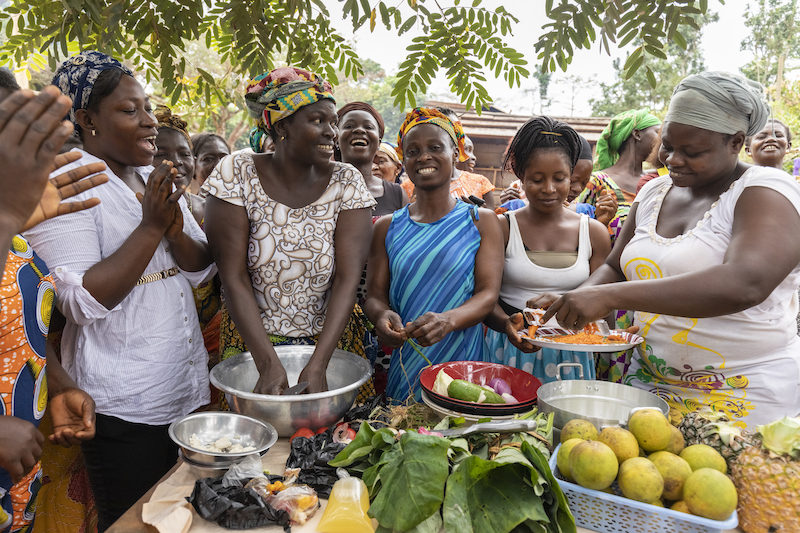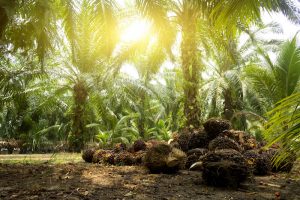Cargill reveals progress on delivering against sustainability and supply chain goals

Cocoa growing community in Ghana, pic (Cargill)
Cargill has released its latest impact report for 2024, noting key milestones for its community engagement, environmental policies and and operating progress, such as investing $100 million into sustainability projects including support for the cocoa sector, writes Neill Barston.
Among the company’s headline areas of achievement for the year, it has reduced missions from its operations by 15.8% achieving, and introduced regenerative agricultural practices on 1.1 million acres of North American land in the past four years, as well restoring 38 billion litres of water in regions of need.
Furthermore, it reported distributing over $130 million to support partners and local communities, in addition to delivering more than 700,000 farmer trainings focused on sustainable agriculture practices and increasing market access. This has brought the total to 7.2 million farmer trainings since 2017.
As for its cocoa-specific achievements, the company asserted that it has continued its path to empower cocoa farmers and farmer organisations through technical skill-building and access to services, improving farming profitability and productivity. It has taken a holistic approach in encouraging agricultural workers to diversify their activities to enhance their incomes.
Moreover, the company, which played a notable role in our latest World Confectionery Conference in Brussels this September, added that it has placed a strong focus on collaborating with partners to address community needs, including healthcare, nutrition, education, and opportunities for women and young people.
Pilar Cruz Chief Sustainability Officer Cargill commented on the report: “Cargill recognises the complex social, economic, and environmental issues facing our world — and we know we can’t do this work alone. With the help of our customers and partners, we are working together to make the world’s food system more sustainable, resilient, and accessible.”
On the critical issue of child labour in the sector, its latest results showed that it has worked with a total of 178 cocoa organisations across Ivory Coast, Ghana and Cameroon, with 211,000 farmers participating in at least some elements of its Cocoa Promise sustainability initiative (143,000 in Ivory Coast), 32,000 in Ghana and 34,000 in Cameroon).
The company has used child labour monitoring and remediation programmes to which all farming groups are subject to, but in terms of results for visits from the business to evaluate progress, 87% (81,000) were achieved in Ivory Coast, which dropped to 32% (10,444 in Ghana) and 21% in Cameroon (7,200 visits), indicating further work to be done in that respect.
Additionally, some 60% of farmers in Ivory Coast that it works with, 73% in Ghana and 88% in Cameroon used insecticides on their crops, while there was a greater issue with the use of fungicide, with only 12% of farmers in Ivory Coast using such techniques, 36% in Ghana, and 92% in Cameroon – which comes amid widespread reports of major diseases such as swollen shoot virus causing major negative impact on cocoa yields across West Africa.
The results also revealed a need for a greater number of farmers to engage in agroforestry techniques – with the present figure in Ivory Coast standing at 11,400 farmers, 5,200 in Ghana and no data for such practices in Cameroon. This has consistently been highlighted as a key area of ensuring greater diversity of crops and yield levels, and stands as a key element of the sector’s plans to improve output.
However, there was more encouraging news as regards the level of polygon mapping of farms linked to advanced monitoring of crops to ensure compliance with upcoming EUDR regulations. In Ivory Coast, 99.9% of 143,000 farms had been mapped, while the figure was 96% in Ghana, with Cameroon requiring further progress at 65% of its farms being mapped.

pic: Shutterstock
Environmental actions
In terms of its climate actions in relation to cocoa, it said that to reduce Scope 1 and 2 emissions within its operations, it has used advanced practices including using cocoa bean shells from its processing facilities as a renewable resource. Cargill’s cocoa processing sites in Ghana and Ivory Coast now use these shells a biofuel.
These are then transformed into syngas, which is used for steam production, and biochar, which aids in carbon sequestration. In the Netherlands, cocoa shells will soon fuel a biomass boiler at Cargill’s vegetable oils plant. Cargill embarked on a partnership to introduce a fully electric pusher and four electric barges in the Netherlands, ensuring zero-emission inland cocoa bean transportation.
As the company added, ten of its factories are on track to cut around 1.3 million metric tons of CO2 emissions over the coming decade by transitioning to renewable energy sources.
Palm oil production
Furthermore, in relation to its palm oil production, the company said that during the past year, it had placed emphasis on making its third-party supply chain, (representing 95% of its volumes), more resilient. As such, it has partnered with more than 26,400 smallholders (nearly 3,000 more than last year) across more than 51,500 hectares in its own operations.

pic: Shutterstock
Notably, it claimed to have made gains in traceability, with progress towards a deforestation-free supply chain by 2025, and it has also reduced operational GHG emission footprint in Indonesia by 270,000 metric tons of CO2e.
As the company added, it has remained an advocate for the No Deforestation, No Peat, and No Exploitation (NDPE) Implementation Reporting Framework (IRF) and in alignment with Deforestation and Conversion Free (DCF) practices to prevent deforestation, adapting to new regulations such as the European Union Deforestation Regulation (EUDR), and the German Supply Chain Due Diligence Act (GSCDDA) to improve respect for human rights and the environment. We are actively participating in global sustainability platforms such as RSPO and the Palm Oil Collaboration Group (POCG).
